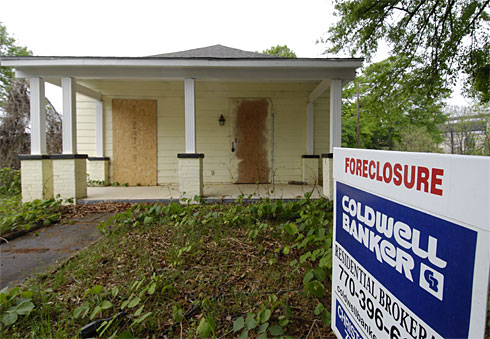Noelle Knox
USA Today

An Atlanta home in foreclosure. Many facing mortgage trouble don’t seek help, a survey says.
With a record number of new foreclosures hitting neighborhoods across the country, a surprising 58% of delinquent homeowners don’t know their lenders may offer ways to help them keep their homes, and 56% don’t know that free counseling exists to help them, a survey being released Thursday found.
The findings highlight the challenges for the mortgage industry as it tries to stem financial and social upheaval from the 2 million foreclosures expected this year.
The survey found that many homeowners are unaware of the most common ways their lender can help them avoid foreclosure.
Only slightly more than half the 1,400 delinquent borrowers surveyed knew that a missed payment could be added to their loan balance, for example, or that their mortgage terms could be extended in some circumstances, the Freddie Mac/Roper survey found.
But the biggest obstacle to stopping a foreclosure, Freddie Mac says, is the frequent failure of lenders or loan servicers to make contact with the homeowner in the first place.
“Servicers are unable to contact borrowers in more than half of the foreclosures we see,” says Ingrid Beckles, vice president of servicing for Freddie Mac, which has about 10 million loans in its portfolio.
One in four homeowners who were at least three months behind on their loan said they didn’t contact their lender or loan servicer because they lacked enough money to make a payment, denied that they were having trouble or mistakenly assumed that no help was available, the survey found.
“When we go into a house that’s been foreclosed to clean it out, we find stacks and stacks of letters from the servicer that have never been opened,” says Robin Stout Migala, senior manager of Freddie Mac’s loss mitigation team. “Many just think the servicers just want to take the house back, which, of course, is not true.”
Even when loan terms are eased, at least temporarily, about one in five of those borrowers default again, she says.
And Freddie Mac invests only in prime mortgages, not subprime, which are more prone to defaults.
The most common reasons people fall behind on their mortgage are loss of a job or reduced income, illness, divorce and a death in the family.
In addition, a rising problem has been subprime borrowers, some of whom are defaulting because of rising loan interest rates.
In December, the mortgage industry and the Bush administration announced a plan to help some of the 1.2 million homeowners with subprime adjustable-rate loans. Lenders have sent hundreds of thousands of letters to homeowners, alerting them that their payments will rise and offering to help them refinance into a loan if they qualify, or freeze their interest rates if they don’t.
They are working with the Homeownership Preservation Foundation, which runs a toll-free hotline to provide counseling for borrowers (888-995-HOPE).
The foundation is receiving about 4,000 calls daily from people in distress.
